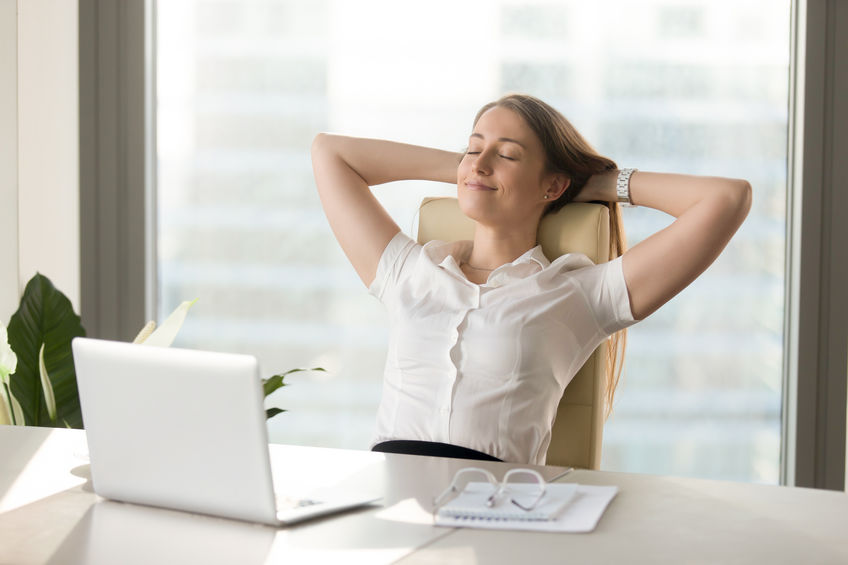In this article, we’ve gathered 22 effective stress-reduction techniques from CEOs, founders, and other professionals. From trying mindful eating to immersing yourself in guided visualization, discover the personal strategies these leaders employ to keep stress at bay. Here are 22 strategies for reducing stress in daily life.
GREAT GETAWAY: Ultra-luxe Amangiri offers stillness and sanctuary
- Try Mindful Eating
- Do Some Push-Ups
- Relax with Guided Imagery
- Learn About Mudras
- Practice Time-Efficiency
- Write Your Thoughts
- Do the Progressive Muscle Relaxation Technique
- Play in MS Paint
- Reduce Your Phone Usage
- Proactively Plan
- Download a Mobile Game
- Reframe Stressful Situations Positively
- Sip Green Tea
- Embrace Mindfulness Meditation
- Build Strong Connections
- Change Your Perception
- Watch an Aquarium
- Prioritize Regular Exercise
- Take a Daily Outdoor Walk
- Employ the Box-Breathing Technique
- Count Backwards
- Immerse Yourself in Guided Visualization
Try Mindful Eating
One stress-reduction technique that I’ve found truly transformative in my personal journey is mindful eating. I recall a particularly overwhelming day when my inbox was flooded and deadlines loomed. Instead of devouring a sandwich while replying to emails, I decided to take a moment.
I sat outside, felt the sun’s warmth, and truly tasted every bite of my meal. Each flavor became a focal point, diverting my attention from the chaos. By the time I finished, not only was I nourished, but my mind also felt clearer and more centered.
Clare Gilbey, Founder, Chakra Practice
Do Some Push-Ups
Doing push-ups is a great stress-reduction technique, as you divert all your energy into performing the exercise. This leaves the body unable to hold on to any stress, only releasing it with every struggle to push up.
Exercise boosts endorphins and replaces negative stress with a good mood. However, with push-ups specifically, the amount of focus and energy that goes into performing them and the strain on the upper body helps get rid of the stress.
John Gardner, Co-Founder/CEO, Kickoff
Relax with Guided Imagery
This technique involves thinking of soothing scenes or experiences to help relax and focus. Free recordings of calming scenes can be easily found online to assist with this. Guided imagery reinforces positive thoughts and a desirable vision, and allows for the effective dismissal of intrusive thoughts that contribute to stress.
Saad Alam, Co-Founder and CEO, Hone Health
Learn About Mudras
One of my favorite techniques for reducing stress is mudras, which are hand gestures commonly used in meditation or yoga. Mudras help engage and influence both our body and mind, even if done for a short duration.
My go-to hand gesture is the Kubera mudra, or the “three-finger technique,” which is paired with visualizing any goal. It provides confidence and calmness in times of uncertainty or anxiety. I also like to pair this mudra with a simple affirmation, which helps clear my mind and get myself out of a negative thought pattern.
Mudras are simple and effective, so I recommend adding them to your mental health first-aid toolkit.
Michaela Ramirez, MD, Founder, O My Gulay
Practice Time-Efficiency
One effective technique is to become time-efficient. I used to spend countless hours on my tasks, which hastened my work progress. Being a perfectionist comes with a price. My attention to detail caused some of my tasks to be delayed. I faced challenges in meeting deadlines. My supervisor became unhappy with my work, too. It spiked my stress levels.
But as soon as I started practicing time management, all the worries went away. I began setting goals for the day, week, and even month. It enabled me to give my utmost attention to urgent tasks first. It also helped me organize my tasks according to their allocated time. My progress got better, and my supervisor became satisfied, too.
Jasen Edwards, Real Estate Agent and Coach, Agent Advice
Write Your Thoughts
An effective stress-reduction technique I personally use is to put things to paper. One of the most common scenarios I see when people are under stress is that they are overwhelmed. This is largely because we are in our heads and are in an emotional state rather than thinking rationally.
When I’m able to put things down onto paper, that’s when I’m able to see the situation clearly, be in my most resourceful state, and make the best decisions. This approach ultimately helps me to reduce stress.
Sebastian Jania, Owner, Ontario Property Buyers
Do the Progressive Muscle Relaxation Technique
One stress-reduction technique I personally swear by is Progressive Muscle Relaxation (PMR). This method involves tensing specific muscle groups and then relaxing them, moving systematically from the toes to the head.
Through this process, I’ve found that not only can I recognize the difference between tension and relaxation in my muscles, but it also provides a profound sense of calm and relief. As I progress through each muscle group, the accumulated relaxation counters the day’s stress.
Michael Sena, Founder and CEO, SENACEA
Play in MS Paint
I’m old-school. When I want to reduce stress over a fifteen-minute period, I open up MS Paint and let my mind wander. Something about the simple interface and the disposability of what you create can really unlock your creativity, and you’ll find interesting workarounds to get things done in a very ’90s program.
It’s something you can do from virtually any device, and a good mind clearer for a brief break.
Corey Donovan, President, Alta Technologies
Reduce Your Phone Usage
Not being on my phone as much during the day makes it easier for me to reduce my stress. I find there can be so much negativity online, and it can also draw you in, causing you to get lost in your feed for hours. This leads to me being less productive, which increases my stress levels.
I try to reduce the amount of time I spend on my phone and set a timer for short periods to remind myself not to be on my phone. I also find that the less you use it, the less power it has over you, and over time, you look at it less and less anyway.
Don Rees, CEO and Founder, RealCraft
Proactively Plan
Plan far into the future to avoid surprises as much as possible. The things that cause me the most stress are the things that I can’t predict or have not thought about as a potential issue. So, I find that doing a bit of pre-work in figuring out how things could go wrong goes a long way to reducing my future stress.
If something goes wrong in this system, well, it’s something I’ve foreseen and is no longer a surprise—just a thing to handle that I saw coming. This type of proactive stress relief works better for me than finding a way to handle stress better in the moment.
Kate Kandefer, CEO, SEOwind
Download a Mobile Game
A simple mobile game on an iPad can distract the mind and actually lower stress levels drastically. It’s not ideal to constantly rely on technology, but it can be very effective in helping to feel less stressed about work, family, money, and life. The games are entertaining and can do so much for an individual who needs to sometimes get away from things.
Find a simple puzzle game that steals your attention and can help you feel less stressed. There are so many games out there that you should be able to find one that can be effective for you.
Sam Ashford, Director, SpiritShack
Reframe Stressful Situations Positively
One effective stress-reduction technique I personally use is reframing how I perceive stressful situations. I follow the “Accept—Choose—Take Action” approach. First, I acknowledge and accept that stress is a natural part of life. Then, I choose to shift my perspective by focusing on potential opportunities for growth or learning within the stressful situation.
Finally, I take actionable steps to address the issue at hand, which empowers me to regain a sense of control and reduce the overall impact of stress. This approach helps me navigate challenges with a more positive mindset and proactive attitude.
Mahesh Kumar, Spokesperson, Transcription Certification Institute
Sip Green Tea
One stress-reduction technique I like to use is taking a quick break to slowly sip a hot cup of green tea. There’s something about cradling the warm cup in my hands and savoring the earthy, slightly bitter taste that is very delightful.
Focusing on the flavors and aromas of the tea forces me to be mindful in the moment instead of getting caught up in worrying thoughts. It allows me to reset mentally and feel centered again. Green tea, in particular, contains L-theanine, an amino acid that has a soothing, tranquilizing effect.
Drinking this healthy beverage helps relax both my mind and body when stress builds up. Stepping away to prepare a cup of green tea gives me a chance to clear my head before tackling tasks again. I highly recommend trying this technique of pausing to sip a nourishing, healthy drink you enjoy.
Fanny Surjana, CEO, Quench List
Embrace Mindfulness Meditation
One way to feel less stressed, which I personally find helpful, is mindfulness meditation. This involves taking a few minutes each day to sit quietly, pay attention to my breathing, and watch my thoughts without deciding if they’re good or bad. Doing this helps me feel peaceful and centered. It’s like taking a break from the busy and noisy parts of life, so my mind can relax and start again.
As I’ve continued doing this, I’ve noticed that it also improves my focus, helps me manage my feelings, and reduces stress and worry. Remember, what helps me might not be the same for you, so it’s good to try different things and see what helps you the most.
Umayr Azimi, Medical Director, MI Express Care
Build Strong Connections
Building strong connections with the people in your life stands out as a solid stress-reduction technique. Regularly participating in genuine conversations and displaying empathy can contribute to a calmer mental state.
The power of these interactions lies in their ability to encourage a sense of belonging and emotional comfort. These bonds make stressors easier to manage, given the shared understanding and mutual support. Prioritizing the cultivation of positive relationships and open dialogue facilitates a pathway to stress relief in your day-to-day experiences.
Beyond personal satisfaction, enabling solid relationships establishes a vital support system to balance stress. These connections serve as avenues for open conversations, enabling the exploration of worries from various angles.
Hilary Kozak, VP of Marketing, LivSmooth
Change Your Perception
One way I have managed to reduce stress is by changing how I see stressful situations. Just changing your perceptions and views can make a lot of difference. Let go of old struggles and past regrets. Accept what has already happened and work toward how you can make a difference. Acceptance can lead to reduced stress and anxiety because you have already chosen the direction you want your life to take.
Brian Hardesty, Owner, On Display Signs
Watch an Aquarium
Whenever I feel overwhelmed, a great way to reduce my stress is to watch my planted aquarium. Not only does it promote mindfulness by helping me focus on the peaceful and serene movements of fish in the tank, but it also helps to stimulate creativity when I am brainstorming ideas for projects. Watching my planted aquarium can be both calming and inspiring at the same time! I highly recommend this activity as an effective way to reduce stress.
Jennifer Spinelli, Founder and CEO, Watson Buys
Prioritize Regular Exercise
Engaging in regular physical exercise is my go-to stress-reduction technique. Incorporating workouts into my routine helps me unwind and refocus. Whether it’s a brisk walk, a vigorous cardio session, or a calming yoga practice, exercise allows me to release built-up tension and clear my mind.
The endorphins released during physical activity act as natural stress relievers, promoting a sense of well-being. Moreover, dedicating time to exercise provides a break from work-related pressures, enabling me to return to tasks with a renewed perspective and heightened productivity.
This practice not only enhances my physical health but also significantly contributes to managing stress and maintaining a healthy work-life balance.
Mark Van Putte, CEO, Huge Supplements
Take a Daily Outdoor Walk
One effective stress-reduction technique I personally use is going on a walk outside for at least 20 minutes every day. When I take a moment to step back from my work and focus on something that benefits my well-being, I feel very grounded in the fact that all pain, stress, or negative thoughts are temporary.
Walking outdoors not only gets my body moving, which releases endorphins, but it also allows me to spend time thinking about all that I am grateful for. Walking and enjoying nature automatically calms me down because it makes me realize that no matter how hard life gets, I am incredibly lucky to be there in that moment, walking in nature.
Julia Kowalski, Marketing Specialist, Achievable
Employ the Box-Breathing Technique
In my line of work, managing AED training operations, stress can often be a frequent visitor. A technique that’s been a beacon for me is the Box-Breathing Technique.
Just last week, when a training session faced unforeseen hitches, my anxiety climbed. Instead of succumbing to it, I found a quiet corner and practiced this technique: inhale for 4 seconds, hold for 4, exhale for 4, and pause again for 4. After a few cycles, the tumult inside me calmed down, helping me navigate the situation with a clearer mind.
Taimur Khan, Operations Manager, AED TRAINING
Count Backwards
When in a moment of major stress, counting backwards from 100 can be helpful. Regaining focus and being able to better control feelings is what makes it easier to reduce stress. Counting backwards forces focus and concentration on something else, which in turn helps regain control of a situation and feelings. It also helps to prevent saying something out of stress and anger, which could later be regretted.
Drew Lever, Chief Marketing Officer, Ria Money Transfer
Immerse Yourself in Guided Visualization
One stress-reduction technique I swear by is “guided visualization.” Whenever I feel overwhelmed, I set aside 10-15 minutes to mentally transport myself to a serene place, often a secluded beach I used to visit as a child.
I immerse myself in the sensory details: the sound of waves, the feel of sand beneath my feet, and the warmth of the sun. This mental “getaway” provides a reset, allowing me to return to my tasks with clarity and calmness. Beyond personal relief, it’s also beneficial for the company. A clear mind often leads to more effective decision-making, ensuring that we continue to thrive and innovate.




